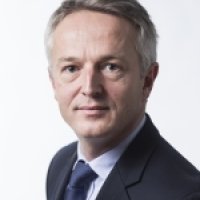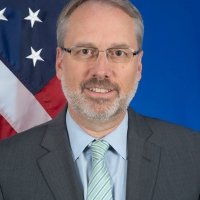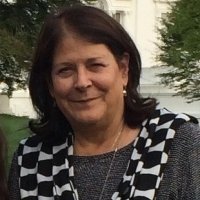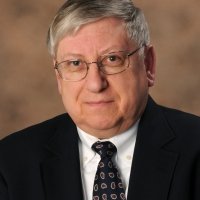Ukraine and the Arctic: Perspectives, Impacts, and Implications
Russia’s invasion of Ukraine has already opened a Pandora’s box of consequences across the globe. With the invasion still in its beginning stages, its effects on Arctic governance, research, and economic activity will only multiply in the coming days and beyond. The seven remaining Arctic states denouncing Russia and temporarily suspending all Arctic Council-related activities is one such immediate consequence and indicates a rapidly changing and challenging baseline for Arctic governance.
The Wilson Center’s Polar Institute and the Norwegian Institute of International Affairs (NUPI) hosted a discussion about how Russia’s invasion of Ukraine will affect Arctic affairs. Speakers from across the Arctic covered topics such as multilateral cooperation and diplomatic relations, military security (national level and NATO policies), economic consequences (including energy politics), and bilateral relations with Russia.
Selected Quotes
Michael Sfraga: The Future of the Arctic and the Multi-Lateral Framework
"In the past 18 days, you and I have witnessed the fabric of Arctic cooperation fraying because of the actions of one Arctic nation—outside of the Arctic region. But the implications of these actions have rippled through every facet of the Arctic. We recognize no country, no region, no people, no global commodity, no bilateral, or multilateral framework, is immune to the impacts of this global shockwave. We gather today at an inflection point in our history and there are real implications for the Arctic. As a result of Russia’s invasion of Ukraine, on a scale not seen since World War II, we are, I believe, witnessing and experiencing the second in a pair of historical bookends set in place. These post-Cold War bookends contain the history of 33 years from the fall of the Berlin Wall to today. And within these bookends you will find the volume that tells the story of the Arctic. And now, it’s up to us to discuss, consider, inform, and influence the next volume: the post-Cold War Arctic. Will it be one of cooperation—qualified cooperation? Will it include all Arctic nations—can it? Will all Arctic nations be able to address, in a meaningful manner, the cause and effect of climate change in and outside of the region? Will we need new or refined frameworks, organizations, structures to address the challenges of a new and globalized Arctic at this moment in our history?
Just recently, Robert Gates, the former U.S. Secretary of Defense and Director of the CIA said, quoting him, ‘our so-called holiday from history is over.’ What does that mean for our Arctic? What does that mean?
Our region is connected to the entire globe, we know that, we talk about it together each day. We see these connections. Arctic nations such as the United States, Canada, Denmark, Iceland, and Norway, they’re NATO member states. We are aware of the role Russia’s Arctic natural gas and oil play in the global energy equation. Our colleagues in Europe are acutely aware of this fact. NORAD is a key component in securing the North American Arctic, the U.S. homeland, as well as allies and partners abroad. We are very well aware that Russia’s Northern Fleet, second-strike capabilities and submarine fleets are based in the Arctic. We track the discussions happening in Sweden regarding that nation’s perspectives on potential NATO membership. We too, listen attentively to public opinion and political discourse in Finland regarding NATO membership; a country that shares a border with Russia that spans more than 800 miles.
Many of us participating today know the Arctic has many dimensions—not just security. There is a wide array of social, cultural, environmental, economic, political aspects of the Arctic that, at this moment, are feeling the tensions originating in Europe. We can feel them—we can see them. From Ukraine to the Yukon, we see how connected, interdependent, and integrated we really are. However, a peaceful and stable Arctic requires a high level of cooperation and foundational trust—but we see such cooperation being altered in ways we may not have imagined just a few weeks ago. Bilateral and multilateral Arctic frameworks and organizations have paused—or altered their work—with Russia, geographically the largest Arctic nation, now on the sidelines of important work that needs to be done on behalf of all citizens of the Arctic and the globe. This my friends, is the context in which we meet today to conduct this first in a series of upcoming Polar Institute Arctic Public Square discussions regarding the impacts and the implications the war on Ukraine is having, and the impacts they will have on the Arctic region."
Ulf Sverdrup: How the Invasion of Ukraine has Changed Norway’s Position in the European Energy Landscape
“The situation in Ukraine has also, I would say, dramatically changed Norway’s position in the European energy landscape. And this strategic importance also, Arctic energy resources. Norway’s a huge provider of energy, gas, and oil to Europe. And, the crisis has increased importance of Norwegian energy into Europe. At the same time, Europe is now moving out of Russian oil and gas. There, in the last week, the EU launched this initiative called the re-power EU, basically moving rapidly out of Russian oil and gas. I think this means that energy extraction in high north, in the Arctic, will become the more desired and more interested in exploiting these resources.”
Jim DeHart: On Why the Arctic Council Paused Its Work
“So, we took the decision, together in the Arctic Council, among the like-minded members, to put a temporary pause on meetings of the Council and its subsidiary bodies. And to pause the work, and I will tell you there's no joy in taking that decision. There’s obviously no joy in in any of this, but it was a very easy consensus, among the like-minded members of the Arctic Council, on the critical need for a pause. And I'd like to make just a few points about what that means and what some of our key considerations are as we as we look ahead.
First, the words 'pause temporarily', were chosen deliberately. This was not a withdrawal from the Arctic Council, it's not an announcement that we're trying to reconstitute the Arctic Council—the membership. It's simply a pause in light of the horrific events and Russia's egregious, unprovoked, completely unnecessary, war of choice against Ukraine. We don't know how long the pause will last. I think part of the logic here for simply pausing is that we are in a situation that is extremely fluid and none of us can predict what the situation with Russia in Ukraine, elsewhere in Europe will look like a week from now, a month from now—it's highly unpredictable. And so, we need this pause and we need the ability to act flexibly in the days and the weeks ahead and because the international situation is unpredictable, I think that there will be many important questions raised today in this discussion. A lot of them will be quite difficult to provide answers for, I think.
But, another point I want to make is we are as committed today as we have ever been to the Arctic Council as a forum and so with all the changes that we have seen over the last couple of weeks, one thing that has not changed, is our commitment to the Council as the premier forum for the Arctic region, as a circumpolar forum, and so as we move forward we will always have at the front of our minds the question of how do we prevent damage to the council? How do we make sure that we sustain the Arctic Council as that effective forum and make sure that it can continue to do its great work for the next 25 years? I can tell you, also, we are very mindful of the impact of all this on the indigenous communities who participate in the Arctic Council as permanent participants—and all of the communities, including in Russia. And, the value of the Council to them and the value of the links that exist, and so we will be mindful of the interests of the communities as we move forward.
And then, finally, I would just want to say that you know we have been, as I said, lockstep with our like-minded partners in the council—those who are absolutely committed to the principles under international law, territorial sovereignty, integrity, and we've been lockstep—will continue to be. We are consulting closely with our fellow Arctic Council members as we speak. And, we will find our way through this together.”
Lawson W. Brigham: Maritime Relationships Must Continue
“I think all of us have to remember that, of course this place is oceans, and coastal, and many of the indigenous people of the Arctic live along the coast. And so, maritime issues are central, and cooperation amongst all of the eight Arctic states and not many non-Arctic states, is important to the future of the Arctic. Step back a moment, where can we actually work with the Russians and the Russian Federation on practical cross-border maritime operations? Those must continue, they did during the Cold War. And I’m speaking about the long border between Norway and Russia, in the Bering Sea, the long border between the United States and Russia in the Bering and Chuckchi Seas. These relationships in the practical maritime world, among the coastguards, and in Russia’s case the FSB, surely should continue—at least in search and rescue; maybe response in some disaster situation. It’s not quite clear where joint fisheries law enforcement can continue, but nonetheless, this is part of maintaining maritime stability. What was suggested, this is a practical maritime world. So those relationships on the operational front must continue."
Katarina Kertysova: What is NATO’s Strategy in the Arctic?
“I’d start by saying that NATO, at this moment, does not have an Arctic strategy or a clear Arctic policy and it’s approach to the Arctic has been traditionally very cautious. NATO, as an alliance, works by consensus, so any decision that would concern the Arctic would have to be agreed upon unanimously by thirty member states. And, because that consensus wasn’t there, the Arctic did not feature in the strategic concept—which was adopted in 2010. And overall, the Northern dimension has not been discussed as often as Eastern or Southern dimensions, or the fight against terrorism. It did, however, appear in the text of the Brussels Summit Communiqué in June last year.
So, since 2014, there has been growing pressure on NATO to rethink its strategic approach to the region and I think that over the past 4 or 5 years there has really been a visible shift in NATO’s approach towards the Arctic from the Trident Juncture Exercise in 2018, which was conducted under an Article 5 scenario, to the establishment of Joint Force Command Norfolk, in 2019. And as we heard, Cold Response Exercise, which is taking place every other year, and which is kicking off today. And at this moment, NATO is in the process of drafting its new strategic concept, which is expected to be approved at the upcoming NATO summit in Madrid in June. It is the second most important document after the Washington Treaty and it sets the direction for the coming ten years. As it is expected that there will be much more emphasis on defense and deterrence; it will be an opportunity for NATO to reevaluate its approach towards the Arctic, but also, its approach towards Russia and China in particular, which did not feature at all in the strategic concept adopted in 2010. So, I’d say that the decisions NATO takes now will really set the tone for the next ten years."
Introductions

US Ambassador-at-Large for Arctic Affairs; Former Chair, US Arctic Research Commission

Panelists




Fellow, Center for Arctic Study & Policy, U.S. Coast Guard Academy


Policy Fellow, European Leadership Network (ELN)
Hosted By

Polar Institute
Since its inception in 2017, the Polar Institute has become a premier forum for discussion and policy analysis of Arctic and Antarctic issues, and is known in Washington, DC and elsewhere as the Arctic Public Square. The Institute holistically studies the central policy issues facing these regions—with an emphasis on Arctic governance, climate change, economic development, scientific research, security, and Indigenous communities—and communicates trusted analysis to policymakers and other stakeholders. Read more


Kennan Institute
After more than 50 years as a vital part of the Wilson Center legacy, the Kennan Institute has become an independent think tank. You can find the current website for the Kennan Institute at kennaninstitute.org. Please look for future announcements about partnership activities between the Wilson Center and the Kennan Institute at Wilson Center Press Room. The Wilson Center is proud of its historic connection to the Kennan Institute and looks forward to supporting its activities as an independent center of knowledge. The Kennan Institute is committed to improving American understanding of Russia, Ukraine, Central Asia, the South Caucasus, and the surrounding region through research and exchange. Read more


Environmental Change and Security Program
The Environmental Change and Security Program (ECSP) explores the connections between environmental change, health, and population dynamics and their links to conflict, human insecurity, and foreign policy. Read more


Canada Institute
The mission of the Wilson Center's Canada Institute is to raise the level of knowledge of Canada in the United States, particularly within the Washington, DC policy community. Research projects, initiatives, podcasts, and publications cover contemporary Canada, US-Canadian relations, North American political economy, and Canada's global role as it intersects with US national interests. Read more


Global Europe Program
The Global Europe Program is focused on Europe’s capabilities, and how it engages on critical global issues. We investigate European approaches to critical global issues. We examine Europe’s relations with Russia and Eurasia, China and the Indo-Pacific, the Middle East and Africa. Our initiatives include “Ukraine in Europe”—an examination of what it will take to make Ukraine’s European future a reality. But we also examine the role of NATO, the European Union and the OSCE, Europe’s energy security, transatlantic trade disputes, and challenges to democracy. The Global Europe Program’s staff, scholars-in-residence, and Global Fellows participate in seminars, policy study groups, and international conferences to provide analytical recommendations to policy makers and the media. Read more

